Bishop Frank J. Dewane led the Act of Consecration from Epiphany Cathedral in Venice, on March 25, 2022, as a “gesture of the Universal Church” to invoke an end to the violence and suffering of the innocents during the war in Ukraine.
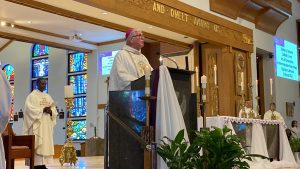 Pope Francis wrote to all the Bishops in the world, asking them to join him in offering “a solemn Act of Consecration of humanity, and Russia and Ukraine in particular, to the Immaculate Heart of Mary.” The Act of Consecration took place on the Solemnity of the Annunciation of the Lord, when the Angel Gabriel told Mary that she would conceive and bear “the Son of the Most High” through the power of the Holy Spirit.
Pope Francis wrote to all the Bishops in the world, asking them to join him in offering “a solemn Act of Consecration of humanity, and Russia and Ukraine in particular, to the Immaculate Heart of Mary.” The Act of Consecration took place on the Solemnity of the Annunciation of the Lord, when the Angel Gabriel told Mary that she would conceive and bear “the Son of the Most High” through the power of the Holy Spirit.
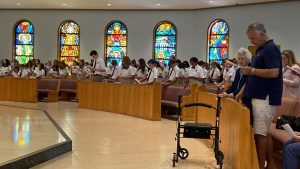 In a nearly full Cathedral, including students from Epiphany Cathedral Catholic School, Bishop Dewane remarked how important it was that the faithful gather “as a people of God, brothers and sisters in Christ, in response to the Holy Father. We gather to pray for the conflict going on in the Ukraine and the suffering that has been inflicted upon the people of Ukraine. It is a Consecration of humanity, as the Holy Father put it – in particular for those in Russia and Ukraine. This is a gesture of not just the Pope, Bishops, or priests, but of the Universal Church.”
In a nearly full Cathedral, including students from Epiphany Cathedral Catholic School, Bishop Dewane remarked how important it was that the faithful gather “as a people of God, brothers and sisters in Christ, in response to the Holy Father. We gather to pray for the conflict going on in the Ukraine and the suffering that has been inflicted upon the people of Ukraine. It is a Consecration of humanity, as the Holy Father put it – in particular for those in Russia and Ukraine. This is a gesture of not just the Pope, Bishops, or priests, but of the Universal Church.”
The Act of Consecration began at noon, to coincide with the prayers in Rome of the Holy Father. The Diocesan prayer service was livestreamed and available on the Cathedral website and on social media (also available at www.dioceseofevnice.org). Simultaneously, Parishes and Catholic schools throughout the Diocese held their own Prayer services.
 For example, students at St. Catherine Catholic School in Sebring joined in the Consecration by praying the rosary. Students at Bishop Verot Catholic High School in Fort Myers gathered in their courtyard to recite the Act of Consecration. At Incarnation Parish in Sarasota, the faithful, as well as students from Incarnation Catholic School joined together. The Consecration also included time for Adoration of the Blessed Sacrament.
For example, students at St. Catherine Catholic School in Sebring joined in the Consecration by praying the rosary. Students at Bishop Verot Catholic High School in Fort Myers gathered in their courtyard to recite the Act of Consecration. At Incarnation Parish in Sarasota, the faithful, as well as students from Incarnation Catholic School joined together. The Consecration also included time for Adoration of the Blessed Sacrament.
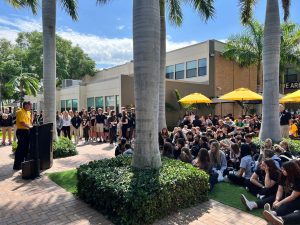 Pope Francis said during remarks from Rome that the consecration “is no magic formula but a spiritual act… It is an act of complete trust on the part of children who, amid the tribulation of this cruel and senseless war that threatens our world, turn to their Mother, reposing all their fears and pain in Her Heart and abandoning themselves to Her.”
Pope Francis said during remarks from Rome that the consecration “is no magic formula but a spiritual act… It is an act of complete trust on the part of children who, amid the tribulation of this cruel and senseless war that threatens our world, turn to their Mother, reposing all their fears and pain in Her Heart and abandoning themselves to Her.”
The Holy Father added that the Act of Consecration “means placing in that pure and undefiled heart, where God is mirrored, the inestimable goods of fraternity and peace, all that we have and are, so that She, the Mother whom the Lord has given us, may protect us and watch over us.”
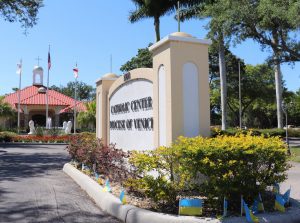 Bishop Dewane added that the Act of Consecration “is about people who are suffering. The Lord calls us to be His instruments and to pray and to call upon our Faith; to call upon Christ; to call upon the saints; to intervene to relieve that suffering that we see so much of – also intervene in that war in Ukraine.”
Bishop Dewane added that the Act of Consecration “is about people who are suffering. The Lord calls us to be His instruments and to pray and to call upon our Faith; to call upon Christ; to call upon the saints; to intervene to relieve that suffering that we see so much of – also intervene in that war in Ukraine.”
Following the Act of Consecration, Bishop Dewane said that we should all continue to pray the Act of Consecration, particularly “when you see the images that all of us have been inundated with through media. It is then that we need to stop, move away from that media, and say a prayer for those who suffer.”
Bishop Dewane then celebrated the Mass for the Solemnity of the Annunciation of the Lord.
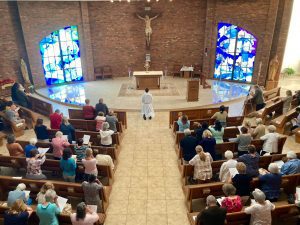 The practice of Consecration to the Immaculate Heart of Mary is closely linked to the apparitions of Our Lady of Fatima. During the third apparition, on July 13, 1917, the Blessed Virgin Mary told three visionaries that God sought to establish the devotion to Mary’s Immaculate Heart in the world, stating that if this request was not granted, Russia would “spread her errors throughout the world, causing wars and persecutions of the Church.” Pope Francis, and previous Popes, have led various consecrations to the Immaculate Heart of Mary, for example, St. John Paul II’s consecration of Russia to the Immaculate Heart of Mary on March 25, 1984.
The practice of Consecration to the Immaculate Heart of Mary is closely linked to the apparitions of Our Lady of Fatima. During the third apparition, on July 13, 1917, the Blessed Virgin Mary told three visionaries that God sought to establish the devotion to Mary’s Immaculate Heart in the world, stating that if this request was not granted, Russia would “spread her errors throughout the world, causing wars and persecutions of the Church.” Pope Francis, and previous Popes, have led various consecrations to the Immaculate Heart of Mary, for example, St. John Paul II’s consecration of Russia to the Immaculate Heart of Mary on March 25, 1984.
The monument sign and the entrances of Catholic Center and Epiphany Cathedral, both in Venice, have small Ukrainian flags as a sign of unity with the people of Ukraine.
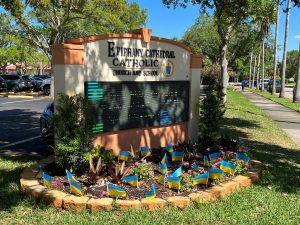 Bishop Dewane has stressed the importance of continued prayer for those suffering. Also, the Diocese of Venice has made it possible for the faithful to contribute toward charitable relief and assist in providing humanitarian aid, as well as necessary recovery efforts.
Bishop Dewane has stressed the importance of continued prayer for those suffering. Also, the Diocese of Venice has made it possible for the faithful to contribute toward charitable relief and assist in providing humanitarian aid, as well as necessary recovery efforts.
Donations may be sent to the Diocese of Venice, with “Ukraine” indicated in the memo or note line at the following address: Diocese of Venice in Florida, Ukraine Relief, 1000 Pinebrook Road, Venice, FL 34285, or visit https://dioceseofvenice.org/ways-to-give/ and click the donate button.






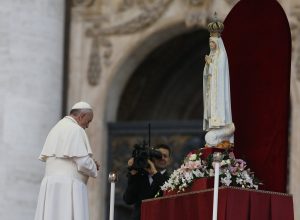 The Consecration will take place at Epiphany Cathedral, 350 Tampa Ave. W., Venice, beginning at noon with the Prayer of Consecration and followed by the Mass. All are invited to participate. The Consecration and Mass will also be livestreamed via Facebook.
The Consecration will take place at Epiphany Cathedral, 350 Tampa Ave. W., Venice, beginning at noon with the Prayer of Consecration and followed by the Mass. All are invited to participate. The Consecration and Mass will also be livestreamed via Facebook.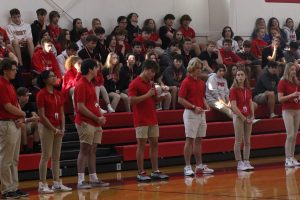 On March 11, 2022, the student body of Cardinal Mooney Catholic High School in Sarasota participated in praying a living rosary as a lead up to Spring Break. A living rosary consists of people representing each bead of the rosary. Each person then leads one prayer of the rosary. Different grade levels represented different decades, including one in Spanish. This was the last group gathering for the students before going on Spring Break.
On March 11, 2022, the student body of Cardinal Mooney Catholic High School in Sarasota participated in praying a living rosary as a lead up to Spring Break. A living rosary consists of people representing each bead of the rosary. Each person then leads one prayer of the rosary. Different grade levels represented different decades, including one in Spanish. This was the last group gathering for the students before going on Spring Break. St. John Neumann Catholic High School students, along with Sister April Hoffman, FMA, attended the Salesian Leadership Retreat the week of March 7-11, 2022. The retreat is run by the Salesian Sisters of St. John Bosco, which is the same religious order that leads Neumann. The group stopped in Hoboken, N.J., for a little sightseeing excursion before traveling to Haledon to meet up with more of the Salesian family. While on the retreat, the warm-weather Neumann Celtics also got a taste of snow during a tour of New York City.
St. John Neumann Catholic High School students, along with Sister April Hoffman, FMA, attended the Salesian Leadership Retreat the week of March 7-11, 2022. The retreat is run by the Salesian Sisters of St. John Bosco, which is the same religious order that leads Neumann. The group stopped in Hoboken, N.J., for a little sightseeing excursion before traveling to Haledon to meet up with more of the Salesian family. While on the retreat, the warm-weather Neumann Celtics also got a taste of snow during a tour of New York City. Local artist, Marcus Zotter, is at it again. He painted another amazing mural on an interior wall of the St. Ann Catholic School library. The artwork incorporates the images of five current students. Earlier in the school year, Zotter created a dolphin-themed mural on a nearby exterior wall.
Local artist, Marcus Zotter, is at it again. He painted another amazing mural on an interior wall of the St. Ann Catholic School library. The artwork incorporates the images of five current students. Earlier in the school year, Zotter created a dolphin-themed mural on a nearby exterior wall. 1st Graders at St. Martha Catholic School in Sarasota conducted an Easter Egg Gravity Investigation on March 11, 2022. The young scientists have been learning about gravity and after making their predictions, they did a variety of tests with different types of fresh and plastic eggs on a ramp, at varying levels and kept track of the results in a data table.
1st Graders at St. Martha Catholic School in Sarasota conducted an Easter Egg Gravity Investigation on March 11, 2022. The young scientists have been learning about gravity and after making their predictions, they did a variety of tests with different types of fresh and plastic eggs on a ramp, at varying levels and kept track of the results in a data table. Three sixth grade girls represented St. Joseph Catholic School in Bradenton as the first ever Battle of the Books Team. The students were Anya, Bailey, and Kimberly. On March 11, 2022, the team competed against other Manatee County Schools at Braden River High School. Teams earned points by answering questions about the 15 Sunshine State Young Readers Award Books for 2021-2022. As first-time competitors, the St. Joseph girls took third place. Congratulations!
Three sixth grade girls represented St. Joseph Catholic School in Bradenton as the first ever Battle of the Books Team. The students were Anya, Bailey, and Kimberly. On March 11, 2022, the team competed against other Manatee County Schools at Braden River High School. Teams earned points by answering questions about the 15 Sunshine State Young Readers Award Books for 2021-2022. As first-time competitors, the St. Joseph girls took third place. Congratulations! Grand displays are not what the Lord wants, explained Father Robert Tatman, Parochial Vicar of St. Jude Parish in Sarasota. The clear example of this is represented in the ashes marked on one’s forehead to open Lent on Ash Wednesday, March 2, 2022.
Grand displays are not what the Lord wants, explained Father Robert Tatman, Parochial Vicar of St. Jude Parish in Sarasota. The clear example of this is represented in the ashes marked on one’s forehead to open Lent on Ash Wednesday, March 2, 2022. For those not prepared for the collection, donations may be sent to the Diocese of Venice, with “Ukraine” indicated in the memo or note line at the following address: Diocese of Venice in Florida, Ukraine Relief, 1000 Pinebrook Road, Venice, FL 34285.
For those not prepared for the collection, donations may be sent to the Diocese of Venice, with “Ukraine” indicated in the memo or note line at the following address: Diocese of Venice in Florida, Ukraine Relief, 1000 Pinebrook Road, Venice, FL 34285.